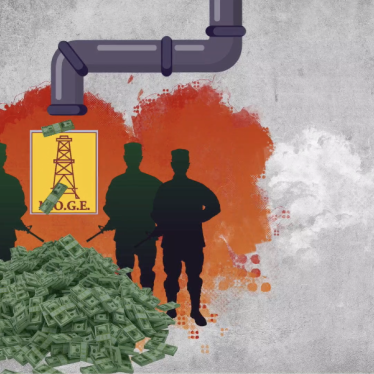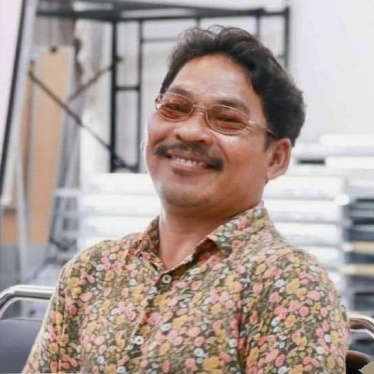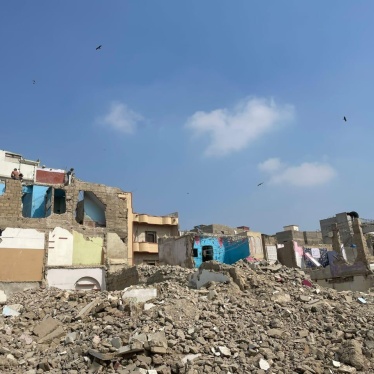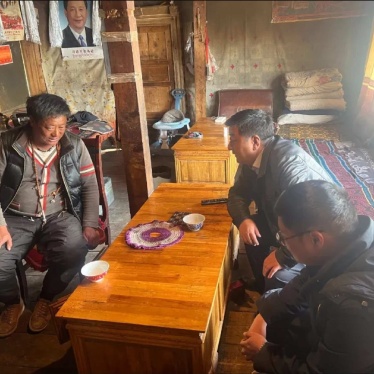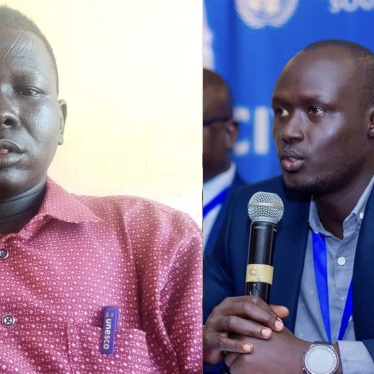Dear Prime Minister Manmohan Singh:
Human Rights Watch congratulates you on assuming the office of prime minister.
India has long been recognized as an important model for a vibrant political culture in Asia. However, as you well know, India also faces serious human rights problems. Some of these have been exacerbated by government inattention, while others, unfortunately, are the direct result of government policies.
As prime minister it is your responsibility to grapple with the threat of more sectarian violence, prevalent child labor, and widespread caste discrimination. The burgeoning AIDS crisis in India demands an immediate and robust response from your government in reforming the country's health care system. The conflict in Kashmir remains unresolved, and unrest continues in several other parts of the country. India's legal system, while in many ways a pillar of support for the rule of law, is in urgent need of judicial reform.
We urge you, therefore, to treat the promotion and protection of human rights as a primary goal of your government. We suggest the following eight issues as matters of priority:
Repeal the Prevention of Terrorism Act (POTA): We understand that you are seriously considering repealing this legislation. We strongly urge you to follow through on this promise. The Prevention of Terrorism Act has allowed Indian security forces to detain individuals indefinitely on suspicion of terrorism without any evidence. Hundreds have been arrested, tortured and jailed. A committee recently appointed to review the numerous complaints about misuse of POTA exposed that in many cases security forces lacked any evidence against those detained under this act.
Your government should ensure that proper legal protection extends to those already detained under POTA. All those in detention under POTA should face new charges, pursuant to due process of law. Your government should guarantee all detainees access to legal counsel and due process.
Furthermore, your government should review and amend other laws that have allowed security forces to operate with virtual impunity. These laws include the Public Safety Act, the Armed Forces Special Powers Act, the Armed Forces (Jammu and Kashmir) Special Powers Act, the Disturbed Areas Act and the Public Safety Act. We also ask you to work to empower the National Human Rights Commission to investigate cases of alleged human rights abuse by armed forces.
Protect the rights of minorities and combat communal violence: We urge you to end government support for communally divisive policies and to bring to account those responsible for orchestrating violence against religious and ethnic minorities. It is crucial to launch a public campaign to prevent future communal violence like those by Muslims in Godhra, or by Hindus in the riots that followed in other parts of Gujarat state. This campaign should include public service announcements aimed at educating the population through efforts to raise awareness of minority rights, and unequivocal condemnation of religious violence and extremism.
Your government should be vigilant against violence by extremist organizations like the Vishwa Hindu Parishad or the Rashtriya Swayamsevak Sangh, which have blamed the defeat of the Bharatiya Janata Party on its supposed dilution of the ultra nationalist Hindutva ideology. In states like Orissa, Madhya Pradesh and Chattisgarh, there has already been a relentless campaign by these groups to engage in violence and communal attacks against minority Christians and Muslims.
Bring accountability for those responsible for the mass killings in Punjab, Bombay, and Gujarat: We urge you to do everything in your power to end impunity for past campaigns of violence against minorities, prosecute and punish those responsible for criminal offenses during the anti-Sikh violence in 1984, the post Ayodhya violence in December 1992 and January 1993 and those responsible for the attacks in Gujarat in 2002. Police responsible for excessive use of force should be prosecuted; those who having the power and duty to stop the violence but did not intervene should be punished. Your government should also vigorously pursue those officials who turned a blind eye toward these atrocities, or in some cases, even actively participated in their planning and implementation.
Hundreds of people were illegally detained and executed by security agencies trying to end the secessionist conflict in Punjab in the 1980s. A decade later, all those responsible have still not been punished despite recommendations from the Supreme Court and the National Human Rights Commission to investigate the allegations of extrajudicial executions. The recommendations of the Srikrishna Commission on the post-Ayodhya violence in Bombay should be implemented without delay. As the recent verdict by the Supreme Court on the Best Bakery trial showed, there has been a total miscarriage of justice in Gujarat after the 2002 riots. In many cases, charges were not even filed against the perpetrators. In others, charges were quietly dropped and cases dismissed. We urge you to appoint independent investigators who will examine all the cases and bring those responsible to trial.
We also encourage you to protect witnesses to prevent them from being threatened against giving evidence. Activists and lawyers campaigning for Gujarat riot victims have come under attack; their safety should be an important concern for your government.
Continue work toward ending the conflict in Kashmir: Your predecessor, Prime Minister Atal BihariVajpayee, initiated peace talks to resolve the conflict in Kashmir and we urge you to continue that effort.
Serious violations of human rights have been a constant feature in Kashmir over the last decade. Gunmen who have targeted civilians should be brought to trial. At the same time, your government should investigate credible reports of Indian security agencies involved in torture, arbitrary detention, and summary executions. Some 3000 people are still missing in Kashmir after they were arrested by security forces. We urge you to ensure that security agencies respect human rights laws in Kashmir, and punish those found guilty of violations.
Promote the rights of Dalits, tribals and economically marginalized: Your party chief, Mrs. Sonia Gandhi, told legislators that "the commitment to provide a firm resolute government devoted to the welfare of …weaker sections of society unites us all in the coalition." We urge you to implement legislation or enact new laws to end caste and religion based discrimination, and to vigorously enforce laws against discrimination in the private sector.
Protect the rights of children: Millions of children are going to work instead of learning at school. The Indian government should protect children from engaging in the worst forms of child labor. Hundreds of thousands of children are bonded laborers who toil as virtual slaves, particularly in the silk industry. Your government should acknowledge the existence and extent of bonded child labor and take immediate measures to enforce the Bonded Labour System (Abolition) Act, 1976, and other relevant laws regarding bonded child labor. India should ratify ILO Convention No. 182 concerning the Prohibition and Immediate Action for the Elimination of the Worst Forms of Child Labour.
It is also important to encourage parents to send their children to school, but they can only do so when education is affordable and accessible. Currently almost half the children in India are out of school. Discrimination on the basis of caste and religion has to end in schools. India should ratify the 1960 Convention Against Discrimination in Education.
Prevent discrimination against those with HIV/AIDS: India is soon expected to have the largest number of people in the world living with HIV/AIDS. Stigma and discrimination against them is widespread in India, connected in large part to fear and misinformation about how the virus is spread. Despite the entry of HIV into the general population in many places, it continues to be associated with already-stigmatized people, wrongly blamed for their behavior-commercial sex workers, men who have sex with men, migrants-- who often have to cope with violent assault upon them. Many living with HIV/AIDS are denied employment and hundreds of thousands of children who have been born with HIV face immediate discrimination. We urge you to advance legislation, proposed by your party while in opposition, to prohibit discrimination against persons vulnerable to the HIV/AIDS virus. We also urge you to repeal section 377 of the Indian Penal code, which effectively criminalizes sex between men and is frequently used as justification for harassment of HIV/AIDS educators. Your government should encourage public statements and appearances from high level government authorities to protect the rights of those vulnerable to HIV/AIDS.
Judicial and legal reform: We urge you to provide training and investigative technology to the police force so that they are able to gather comprehensive evidence, and at the same time, initiate judicial reform, to end the culture of 'encounter killings' or illegal summary execution of suspected criminals. We also urge your government to ratify the Convention against Torture and Other Cruel, Inhuman or Degrading Treatment or Punishment.
We strongly recommend you immediately implement the recommendations by the National Police Commission, specifically those that call for mandatory judicial inquiry in cases of alleged rape, death or grievous injury of people in police custody.
The Committee on Criminal Justice Reforms headed by Justice V.S. Malimath has suggested better training of police, judges and prosecutors to end corruption and incompetence. These should be accepted. However, many of the recommendations value expediency over the fundamental right of the accused to a fair trial, and pose a serious threat to the basic guarantees of due process in the criminal justice system. We suggest a careful examination of these recommendations in order to ensure that judicial reforms satisfy Indian and international human rights standards.
Thank you for your consideration. We look forward to a fruitful dialogue with you and your government on these and other matters.
Sincerely
Brad Adams
Executive Director, Asia Division
